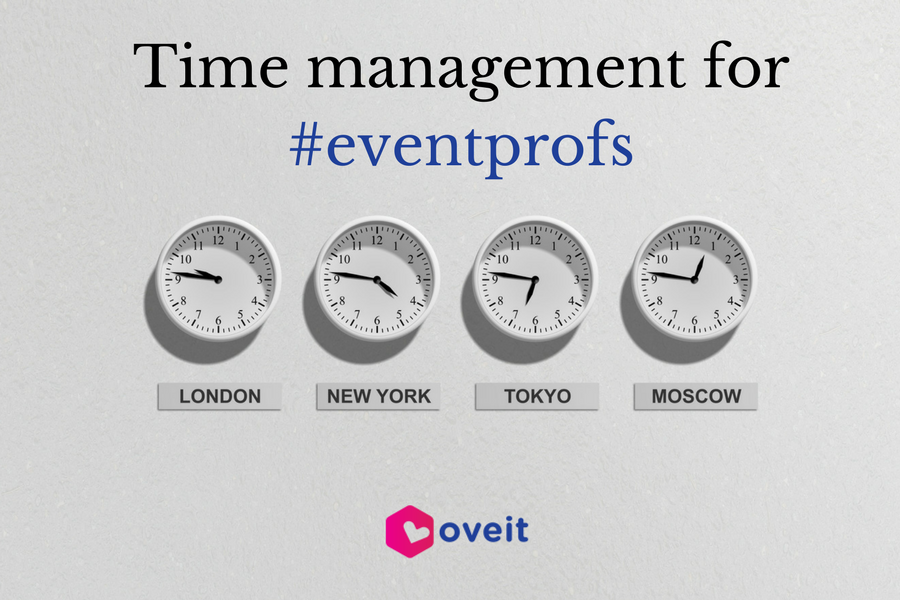Let’s face it…there are times when we all feel like our days are much shorter than everyone else’s. 24hours? You feel like they’re gone like the wind. Of course, everyone has this feeling every once in a while; but #eventprofs are likely to find themselves more often in this situation. And although there are times when 24 hours in a day are simply not enough, other times is just a problem of time management…or like a friend of mine likes to say…of life management.

Here are some time management principles that can help you:
Plan ahead
“Lack of direction, not lack of time, is the problem. We all have twenty-four hour days,” said Zig Ziglar. Or, in other words, if you don’t know what you want to do how will you know when you’ve finished? This is why it is vital to set goals. Try to break big tasks into smaller action steps and take them one at a time. Use a to-do list to keep track of what you need to do on a daily basis, it’s one of the most efficient ways to keep you focused on what needs to be done. You can also use a Not-to-do list to remind you which are the tasks that will just keep you busy, without helping you reach your goals. If you have multiple events per month, use an event registration software to keep event-related information in one place.
Focus on what adds value
If there’s not enough time for everything then you should focus on what adds value to your event. Implementing a cashless payment system is more important than negotiating an extra 1000$ from one of your sponsors (or it should be considering that Millennials value experiences more than anything else). If you don’t have the time for both you should do the task that has the greater long time impact on your business (implementing a cashless payment system will offer your attendees a better experience).
Prioritize your task list
Although it may seem so, not everything on your list is #1. Try to divide your tasks based on their importance and always start with the most important task. A good way for you to do this is by using Eisenhower’s Urgent/Important formula and to “tackle” tasks in that order.
You can’t control everything
Some things are simply out of your control. If there is an electrical problem 2 days prior the start of your event and you are not an electrician…call one. Or two. And let them do their job while you don’t keep your mind busy with this problem. There are experts trying to do their job, you must to yours. The same rule applies to any situation that is out of your area of expertise: don’t let it keep your mind busy. If you can’t fix it you shouldn’t waste your time on it. Concentrate on the things that you can control.
Group similar tasks
It’s easier to get things done if you group them. Need to place 20 phone calls to your suppliers? Book two hours on your agenda for it. Pour yourself a cup of coffee and start making those phone calls. Use the same rule if you have to respond to a large number of emails. Need to meet with your sponsors/partners/? Try to set more meetings in one day – and use it just for this. We, as humans, are not especially good when it comes to multitasking, so grouping similar tasks will help you become more productive.
Don’t get distracted
Remember that night when you opened your laptop just to watch a short Youtube video and found yourself, 4 hours later, reading about Molecular evolution? Well, this tends to also happen when you open FB “just for a sec”, to check out who shared your hilarious status update. Just received an email? You don’t need to stop what you were doing to check your inbox, email is rarely used in life and death situations; it can wait.
Expect the unexpected
Although interruptions are not necessarily pleasant they tend to appear (almost on a daily basis). So, when you make your agenda for the next day, try to “block” some time just for the unexpected situations that may occur. Some things simply can’t wait. This way you will be able to finish both the list in your agenda and the new “problems” that may occur.
Avoid burnout
The longer you work without a break, the less productive you become. Small breaks will help you stay focused and relax; use the Pomodoro technique to see if it suits you. Fresh air and workouts (or walks) are particularly helpful if you try to avoid burnouts. Don’t neglect your health when you find yourself on a tight schedule, it may become a rather dangerous habit.
We all have 24 hours in a day (i think…) but what we can achieve in these hours depends on how carefully we use our time.